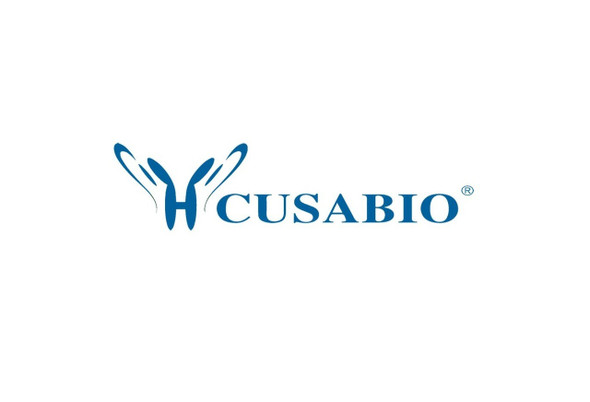Cusabio Gallus gallus Recombinants
Recombinant Chicken Glyceraldehyde-3-phosphate dehydrogenase (GAPDH) | CSB-EP009232CH
- SKU:
- CSB-EP009232CH
- Availability:
- 3 - 7 Working Days
Description
Recombinant Chicken Glyceraldehyde-3-phosphate dehydrogenase (GAPDH) | CSB-EP009232CH | Cusabio
Alternative Name(s): Peptidyl-cysteine S-nitrosylase GAPDH (EC:2.6.99.-)
Gene Names: GAPDH
Research Areas: Others
Organism: Gallus gallus (Chicken)
AA Sequence: VKVGVNGFGRIGRLVTRAAVLSGKVQVVAINDPFIDLNYMVYMFKYDSTHGHFKGTVKAENGKLVINGHAITIFQERDPSNIKWADAGAEYVVESTGVFTTMEKAGAHLKGGAKRVIISAPSADAPMFVMGVNHEKYDKSLKIVSNASCTTNCLAPLAKVIHDNFGIVEGLMTTVHAITATQKTVDGPSGKLWRDGRGAAQNIIPASTGAAKAVGKVIPELNGKLTGMAFRVPTPNVSVVDLTCRLEKPAKYDDIKRVVKAAADGPLKGILGYTEDQVVSCDFNGDSHSSTFDAGAGIALNDHFVKLVSWYDNEFGYSNRVVDLMVHMASKE
Source: E.coli
Tag Info: N-terminal 6xHis-tagged
Expression Region: 2-333aa
Sequence Info: Full Length of Mature Protein
MW: 39.6 kDa
Purity: Greater than 90% as determined by SDS-PAGE.
Relevance: Has both glyceraldehyde-3-phosphate dehydrogenase and nitrosylase activities, thereby playing a role in glycolysis and nuclear functions, respectively. Glyceraldehyde-3-phosphate dehydrogenase is a key enzyme in glycolysis that catalyzes the first step of the pathway by converting D-glyceraldehyde 3-phosphate (G3P) into 3-phospho-D-glyceroyl phosphate. Modulates the organization and assbly of the cytoskeleton. Also participates in nuclear events including transcription, RNA transport, DNA replication and apoptosis. Nuclear functions are probably due to the nitrosylase activity that mediates cysteine S-nitrosylation of nuclear target proteins .
Reference: Complete nucleotide sequence of the messenger RNA coding for chicken muscle glyceraldehyde-3-phosphate dehydrogenase.Panabieres F., Piechaczyk M., Rainer B., Dani C., Fort P., Riaad S., Marty L., Imbach J.L., Jeanteur P., Blanchard J.-M.Biochem. Biophys. Res. Commun. 118:767-773(1984)
Storage: The shelf life is related to many factors, storage state, buffer ingredients, storage temperature and the stability of the protein itself. Generally, the shelf life of liquid form is 6 months at -20?/-80?. The shelf life of lyophilized form is 12 months at -20?/-80?.
Notes: Repeated freezing and thawing is not recommended. Store working aliquots at 4? for up to one week.
Function: Has both glyceraldehyde-3-phosphate dehydrogenase and nitrosylase activities, thereby playing a role in glycolysis and nuclear functions, respectively. Glyceraldehyde-3-phosphate dehydrogenase is a key enzyme in glycolysis that catalyzes the first step of the pathway by converting D-glyceraldehyde 3-phosphate (G3P) into 3-phospho-D-glyceroyl phosphate. Modulates the organization and assembly of the cytoskeleton. Also participates in nuclear events including transcription, RNA transport, DNA replication and apoptosis. Nuclear functions are probably due to the nitrosylase activity that mediates cysteine S-nitrosylation of nuclear target proteins (By similarity).
Involvement in disease:
Subcellular Location: Cytoplasm, cytosol, Nucleus, Cytoplasm, cytoskeleton
Protein Families: Glyceraldehyde-3-phosphate dehydrogenase family
Tissue Specificity:
Paythway:
Form: Liquid or Lyophilized powder
Buffer: If the delivery form is liquid, the default storage buffer is Tris/PBS-based buffer, 5%-50% glycerol. If the delivery form is lyophilized powder, the buffer before lyophilization is Tris/PBS-based buffer, 6% Trehalose, pH 8.0.
Reconstitution: We recommend that this vial be briefly centrifuged prior to opening to bring the contents to the bottom. Please reconstitute protein in deionized sterile water to a concentration of 0.1-1.0 mg/mL.We recommend to add 5-50% of glycerol (final concentration) and aliquot for long-term storage at -20?/-80?. Our default final concentration of glycerol is 50%. Customers could use it as reference.
Uniprot ID: P00356
HGNC Database Link: N/A
UniGene Database Link: UniGene
KEGG Database Link: KEGG
STRING Database Link: STRING
OMIM Database Link: N/A









